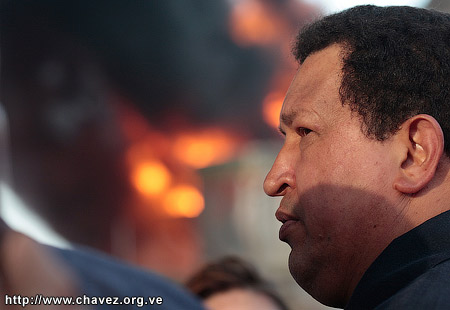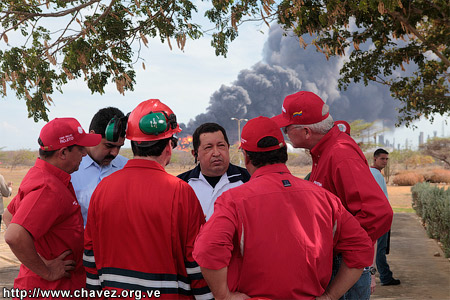Snipers, Blasts, and Disinformation Campaigns in Venezuela as Elections Draw Closer

The question, therefore, is whether the Venezuelan government is able to maintain its grip on the situation in the country, considering that Radonski's supporters and other radical opposition groups are about to put to work their frightening Plan B. Suspicious projections surfaced a couple of months ago that the prospects for Radonski would brighten overnight if a serious technological disaster – a one that can be convincingly blamed on Chavez and his regime - erupts in Venezuela. The forecast materialized on August 25 in the Falcón state, the Paraguana Peninsula, when a blast shattered the Amuay refinery complex. According to snap assessments, it was caused by a gas leak, but the causes behind the leak hitherto remain unclear.

The Amuay facilities maintenance is known to have absorbed $6b over the past three years, and still fire spread across the products storage area at a lightning speed regardless of a host of safety measures. It took three days to extinguish the fire, and the death toll over the time – a total of at least 50 people – included refinery workers, several residents from a nearby village, and the national guards dispatched to Amuay to cordon off the site. In an unlikely coincidence, the Internet portals of a number of Venezuelan government institutions came under a massive hackers' attack which bore the hallmarks making it possible to trace the operation back to servers located in Qatar, Kuwait, and Saudi Arabia.
Chavez announced three days of mourning in Venezuela and ordered an in-depth probe into the incident, warning the nation against hasty verdicts in an attempt to avert escalation parallel to the final phase of the electoral campaign. The opposition's response was bullish and appeared to be carefully coordinated as traditional outcries over Chavez's allegedly dictatorial rule mixed with charges that the administration of the Venezuelan oil and gas sector was incompetent and calls for the ouster of energy minister and PDVSA chief Rafael Ramirez. The media pressed alarmist forecasts about imminent gasoline supply disruptions while Globovision, a TV channel with a reputation for kick-starting anti-government campaigns, aired the footage showing the onset of the catastrophe. It did not evade the pro-Chavez viewers that, for a reason left unexplained, a professionally equipped Globovision volunteer correspondent happened to be on site shortly before the blast, at night time in an essentially unpopulated area.
One gets an impression that as of late occasionally lethal incidents – a blast and a fire at an arsenal in the Aragua state, several mutinies staged by convicts in jails, a series of helicopter crashes, catastrophes involving aircrafts owned by the Conviasa and Aéropostal companies, and power supply breakdowns in major cities - recurred with unusual frequency in Venezuela. The opposition media cite the bad news to spread a general sense of panic and discontent, mostly trying to connect to the middle class audiences. Venezuelan watcher Nestor Francia says a new catastrophe with an even greater number of fatalities might be planned by the opposition whose urgent agenda is to maximally eat away at Chavez's support base, to reinvigorate Radonski's demoralized constituency, and to attract the undecideds – 25-30% of the population, notably – to the pro-Radonski camp. The likelihood of new troubles spilling in Venezuela in the run-up to the October 7 poll appears to be abnormally high. The list of potential targets comprises railroad stations, power plants, the Caracas subway, the water supply system, and key bridges…
The Venezuelan government is tightening up security across the country aware that the number one enemy, the US, is a ruthless player. Washington cannot tolerate a fully sovereign Venezuela whose leader freely speaks his mind, is absolutely autonomous politically, and contributes to the formation of regional blocs to which the US is not welcome. The US establishment is obsessed with an idea of getting rid of Chavez, the mission topping the Latin American priorities lists in the CIA and other US agencies. Washington thought of having Chavez removed due to “natural causes” after he had won the 2006 elections. Fighting cancer, he had to somewhat tone down his activities domestically and internationally, and the Western media readily unsealed the successor theme with an eye to inciting rivalries in his inner circle. Contrary to what his foes dreamed of, Chavez was back in shape by the start of the 2012 electoral campaign, energetically touring the country as usual.
The collapse of the former Anti-Chavez plan must be the reason why these days the US intelligence community's contractors show up increasingly often in Venezuela, arriving in the guise of tourists, etc. and leaving shortly after studying the local scene so as to stay clear of the Venezuelan anti-espionage agency's optics. The visitors' military records do loom through their appearances and conduct, and the Venezuelan security service suspects strongly that Academi, the US-based security firm formerly known as Blackwater, is putting together far-reaching designs for the country.
In a recent case, a “tourist” with a tentative Academi background was taken in custody in Venezuela around ten days ago in the Táchira state, near the Columbian border. A man of thirty made an attempt to dispose of pages from his notebook when the police inspected a bus at a border checkpoint. As it transpired later, he was a naturalized US citizen of Dominican origin who had served in the US Marine Corps. The individual's passport identifying the carrier as Eduardo Acosta featured an impressive collection of entry visas, the destinations being conflict zones like Iraq, Afghanistan, Jordan, and Libya, making it a credible hypothesis that the ongoing trip was similarly arranged with far from peaceful purposes. Acosta, if the name was real, was not too talkative during a police interrogation and was soon allowed to meet with the US Consulate staff who described him as a minor drug trafficker escaped from a Columbian jail where he was doing a five-year sentence and awarded a brief leave for exemplary conduct. A woman claiming to be Acosta's wife came to Venezuela in no time to repeat exactly the story related by the Consulate staff. Commentator Alvarado Godoy, renown for covering on a regular basis the CIA operations in Latin America, released on August 20 an opinion piece via the Rebelión outlet condemning the information supplied by the US officials in connection with the story as patently absurd.
The Venezuelan counter-espionage agency found no mentionings correlating with the Acosta legend in the Columbian media, which have a tendency to report all arrests on drug charges, or in the Internet, and the validity of the passport presented by the visitor could also be called into question since using fake IDs is routine practice for the Academi contractors. The US Embassy demands that Venezuela send Acosta back to where he was supposedly held, but political scientist Raúl Bracho expressed a view at Aporrea.org on August 26 that the individual could be part of a team of snipers dispatched to assassinate Chavez. Bracho holds that the first sniper from the bunch must be hiding somewhere in Venezuela and Acosta's task was to pick an appropriate spot for the attempt.
Time will show if the authors of Plan B dare to destabilize Venezuela with the elections in sight. No doubt, at the moment they are watching how the society in the country reacts to the Amuay tragedy. One can get a reasonable idea of their scenario of choice by playing with 'the Mercenaries 2: World In Flames' computer game, where fighting rages in Venezuela over its oil reserves. One of the episodes involves the sabotage of a refinery and an Acosta look-alike with a US special forces past skillfully killing off the Venezuelan bad guys...